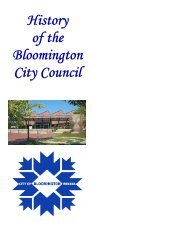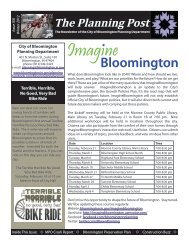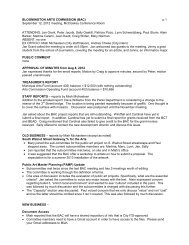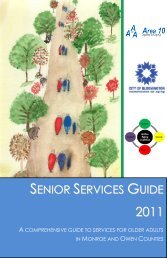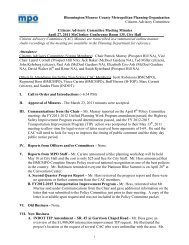Peak Oil Task Force Report - City of Bloomington - State of Indiana
Peak Oil Task Force Report - City of Bloomington - State of Indiana
Peak Oil Task Force Report - City of Bloomington - State of Indiana
Create successful ePaper yourself
Turn your PDF publications into a flip-book with our unique Google optimized e-Paper software.
3. The <strong>City</strong> should establish a neighborhood compost collection program. It<br />
should use this compost for community gardens, especially those which<br />
benefit local hunger relief programs.<br />
As described in the Sustenance chapter, a decline in cheap oil will result in greater food<br />
insecurity, especially among economically‐vulnerable populations. Programs for growing<br />
food within the city will need to be expanded. The <strong>City</strong> should begin to identify sites for<br />
neighborhood composts.<br />
4. The <strong>City</strong> should work toward encouraging existing apartment complexes to<br />
provide recycling services to their tenants and should require any new<br />
apartment development to do so.<br />
Currently, the <strong>City</strong> picks up waste and recycling only from residences which contain four or<br />
fewer units. Buildings <strong>of</strong> five or more units may or may not provide recycling services to<br />
their tenants. The <strong>City</strong> should work toward encouraging existing apartment complexes to<br />
provide recycling and should require any new apartment development to do so.<br />
5. The <strong>City</strong> should support the establishment <strong>of</strong> a community materials recovery<br />
facility.<br />
The Monroe County Solid Waste District currently outsources the processing <strong>of</strong> paper,<br />
cardboard, aluminum, glass and plastic. Currently, these recyclables are taken to<br />
<strong>Indiana</strong>polis for processing. From 2005‐2008, the District outsourced processing for<br />
11,575 tons <strong>of</strong> paper, cardboard, aluminum and plastics. Those items were valued at more<br />
than $1.25 million, but the District only received about $275,000 in rebates. A local<br />
recovery facility would likely not only generate revenue, but would keep such processing<br />
local, obviating the need to transport the community’s recyclables 50+ miles. Should such<br />
transport become cost‐prohibitive, localizing this service makes our community more<br />
resilient. The <strong>City</strong> should work with other community stakeholders to support this effort.<br />
Similarly, as the <strong>City</strong> works to promote composting, it should consider the establishment <strong>of</strong><br />
a community organic materials recovery facility. See further the Sustenance chapter.<br />
<strong>Report</strong> <strong>of</strong> the <strong>Bloomington</strong> <strong>Peak</strong> <strong>Oil</strong> <strong>Task</strong> <strong>Force</strong><br />
57




